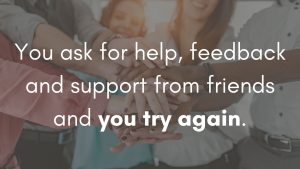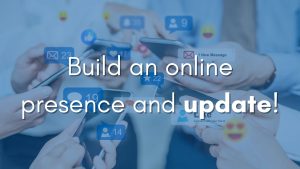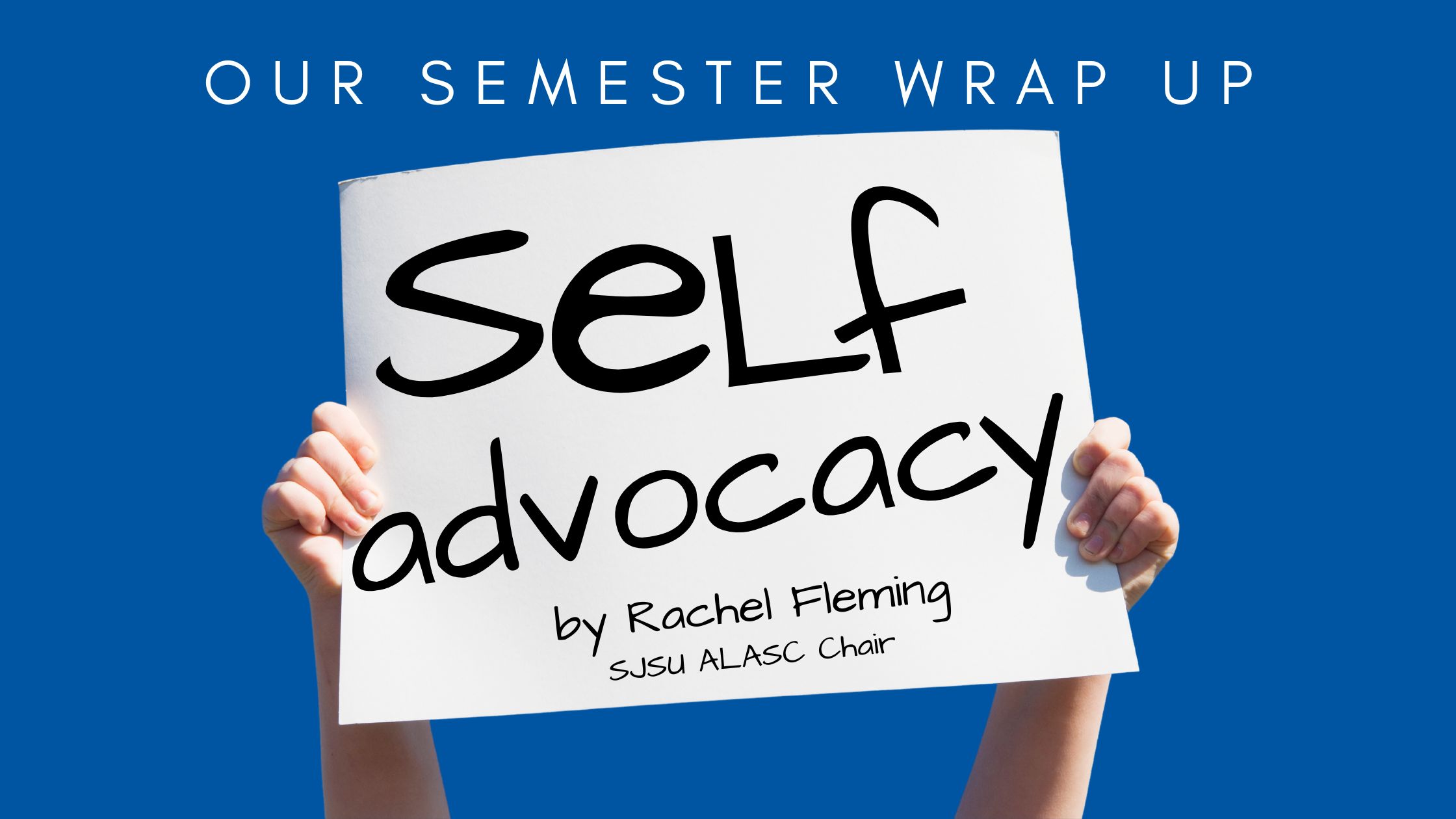After a semester of conversations around self-advocacy, our Fall 2022 SJSU ALASC Chair Rachel Fleming reflected on all the events and conversations that she and the ALASC executive team had participated in.
Self-Advocacy: Why & How
Ideally everyone should have a seat at the table, but realistically many people have to ask for a seat. In all probability many had to campaign and possibly fight a bloody ruthless battle to attain a seat at the table.
In an ideal world you don’t need self advocacy skills because you have co-workers, a boss, a director and a system that advocates for you. Realistically, we know that many systems only benefit a privileged few, or the most outspoken voice, and as we all have learned, life is not fair.
These realities present a harsh truth: we must be our own advocates.

Competing with the endless noise of our information universe
Entering the world of library school I have met countless library students at different stages of their journeys. Some have worked in a library for years, while others are switching to a new career. These students are creative, smart and passionate about the LIS world. What I don’t see is a lot of boisterous, debate-loving students shouting, “Let’s go out into the world and show everyone who we are and what we do!” and unfortunately, we need more loudmouths to compete with the endless noise of our information universe. Librarians are bent under the weight of vocational awe and librarianship as a care-work burnout, which is now a prevalent topic of conversation. In an age of constant online stimulation and massive million dollar marketing campaigns with information booming, the world of libraries grows smaller when they should be getting bigger and more relevant. People say, “Libraries still exist? Why? We have Google, we don’t need libraries!”
And yet, millennials use libraries more than the previous generation, California has the lowest literacy rates in the nation, and states that have defunded K-12 teacher librarians are starting to see negative ripple effects and information illiterate adults. The world of information has become so vast it overwhelms the average consumer who now more than ever needs a trusted librarian to guide them through the deluge. Information literacy classes and programs should be soaring! Marketing librarians as community mentors and fact checking wizards should be the norm! And yet….crickets….defunding….libraries labeled as outdated and unnecessary…..why? We must develop our voice and add volume and validity to our message because the next generation of librarians will need to advocate for themselves and for their place in the information world.
HOW do you advocate for yourself? What must you do?
The short answer?
You practice.
You fail.
You try again.
You ask for help, feedback and support from friends and you try again.
You utilize every tool, technology, connection, and opportunity.
You build your self advocacy muscles slowly over time.
Your toolbox

Self advocacy is difficult, it’s uncomfortable, and in today’s digital information age, it is an essential skill to learn and practice. At its foundation you need to believe in yourself and your work product and know that what you offer the world is an essential service that makes the world better. As Dr. Uila Gosart mentioned in her talk on self advocacy, you need to know what is meaningful to you and understand the indivisible self. Standing on this self-belief and self-awareness, we build outward. We have to ask for what we want and take practical steps towards the future we deserve. Listen to the voice inside that says “I deserve that job!” And say to that voice, “Great, now let’s take the steps to go and get it!”
So HOW do you go about doing this, where do you start?
Be organized! You are a MLIS student, you’re learning all about organization and structures. You must make a system and a roadmap that works for you. These are the 10 steps I have developed in my MLIS journey:
-
- Know yourself & your community, your strengths, values, and what your career goals are specifically. You cannot ask for what you want/deserve if you don’t know specifically what that is. Do your own self evaluation and inventory- Dr. Gosart’s Notions of the Self. What are your long term career goals? Where do you see yourself in five years? Ten years? What skills can you be working on now to make yourself a more appealing candidate? What skills do you have that are transferable? What skills and services are you currently bringing to the table and are you being fairly compensated for them?
- Know your rights. Legal information can be daunting, but at the very least you need to know what your state and local laws are on employee rights.
- Know what you’re up against. Fighting an unseen force is difficult. It helps to identify what the issue is: systematic barriers, pay gaps, microaggressions, closed doors, gaslighting, lack of transparency. Once you have identified what the biggest barrier is, you can take steps to overcome it.
- Cultivate support: You are not alone! Realize you have allies who will help you and want you to succeed. Work to develop direct lines of communication with people in positions of power who could advocate for you or with you. Be an ally and advocate for others. Recognize that some managers or leaders would love to help, but need you to help motivate, galvanize and bring values into action.
- Do your own research on an industry, on other’s expectations and goals, and pitch yourself. Write out a script, practice it on your pet, significant other or a video on your phone. Practice and revise.
- Work on your assertive communication.
- Develop scripts and narratives you can utilize in different scenarios.
- Learn to say, “Respectfully I disagree.”
- Learn how to appeal decisions and creatively problem solve. No one wants to hear a list of complaints without a proposed solution and a respectful organized stated case.
- Get information and decisions in writing.
- Always be respectful, direct and stand firm on the principles of what you are voicing.
- Recognize and work with non-verbal cues and other’s unspoken expectations. .Recognize that while something might feel intentional and hurtful, the truth is that many people are cruel in their ignorance -or lack of education on a topic, not out of maliciousness, and if presented with an alternative might be happy to embrace your request.
- Build a network – I know, most of you hate it! But it is essential!
-
- Volunteer to join a student organization like ALASC.
- Volunteer at an institution you would like to work at!
- Cold call/email local libraries and LIS organizations you’d like to be a part of and ask to do a shadow day with someone.
- Talk with people in the field. If you want a promotion at a place you currently work, let people know you want it! If you would like to work at an organization, tell them! People can’t read your mind, and unless you have vocalized what you want, you diminish the possibility that someone could help you. Ask about internships, entry level jobs, suggest the possibility they could make a new position based on a need and express your interest! Ask about job opportunities!
- Go to local conferences and connect with local chapters of library organizations: ALA, CLA, SLA, ACRL. Meet like minded folks, the world itself is small, once you get in and meet a few people, you’ll start to meet them all!
- Submit proposals to present at local and national library conferences.
- Have one-on-ones with people in the industry and get their advice.
-
- Build an online presence.
-
- Keep records of everything! Document your successes, and publish them so that others can see what you have already done.
- I’m just starting to build my own little website. ‘Google Sites’ is FREE and I have an old domain I attached: www.rachelfleming.com
- Use LinkedIn
- Follow as many LIS-related accounts as you can–this includes dream organizations you would love to work for (NARA! The American Film Institute! Internet Archive!), professional organizations (e.g., ALA, CLA, IFLA), and library superstars!
- Keep your profile up-to-date: try to update your LinkedIn profile at the end of every semester. Don’t forget to add your MLIS courses, volunteer work, LIS skills, and relevant projects!
- Interact as often as you can– liking, commenting, and following are all great ways to show your professional activity and networking skills.
- Check out the recording for the ALASC Rock Your Profile Workshop with Ryan Zervakos from LinkedIn to learn top tips for optimizing your LinkedIn profile!
- Have an online portfolio to demonstrate your skills rather than just list them out.
- Letters of Recommendation: from bosses, supervisors, teachers, even a respected friend who has a great job title.
- Visit the SJSU Career Center for free assistance in building your resume.
-
- Don’t be discouraged by failure and rejection. A closed door, a “sorry we’re not interested” is still a success BECAUSE YOU TRIED and that means you’re building that self advocacy muscle! Each time you attempt to network, you ask about a job opportunity, you submit a proposal, you go to the gym for your self advocacy muscles and the more you work them out, the stronger and better you’ll be at it.
- Be a willing educator: Realize that while it might not be ideal, you have to be willing to educate others about issues. Ideally everyone would take the time to educate themselves and do their own research, but in the real world often this isn’t happening. You have to be willing to put in the emotional, mental and time consuming work to educate others.

The world of information is vast, and uncivilized, and as information professionals we deserve a place in it. However, we will need to ask (and possibly fight) for that place. We will need to advocate for our place individually, for our coworkers, and for our institutions. In doing so we empower ourselves and others, by setting boundaries and taking control we can creatively and effectively problem solve and build safe inclusive environments. We are the next generation of librarians, we will need to stand on our values of equity, diversity, and inclusion with loud voices, strong hearts and steadfast action.
Thanks to all of our members for going on this journey with us all semester. Take a look back on our events and blog posts from Fall 2022 by browsing our Archive through the dropdown menu to the right of this post!
